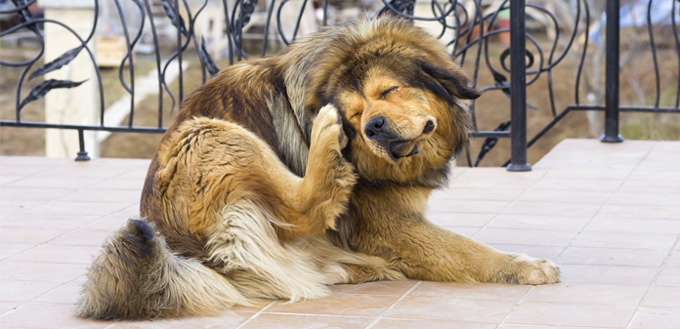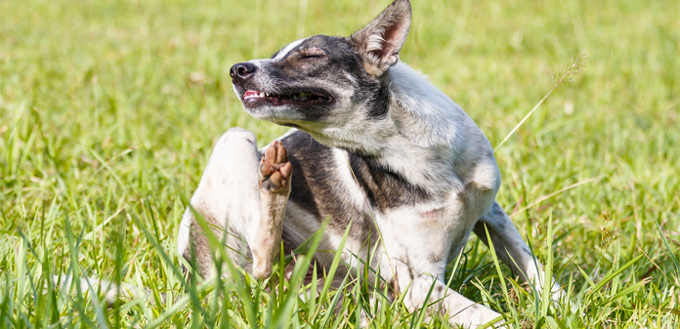What could be more frustrating for a dog than to feel an incessant itch on its skin which does not go away despite repeated scratching? All dog owners ought to be prepared for the fact that their beloved canines are prone to start feeling itchy at some point, and once this cycle starts, it just tends to continue.
At this point many dog owners make the mistake of ignoring this activity, thinking that it would cure by itself. Unfortunately, itchiness in dogs is a condition that is indicative of a skin problem and would simply refuse to disappear unless the owner takes appropriate steps in the form of remedies, diet and grooming. If allowed to continue unabated, incessant itchiness could result in having an irritable pet that could injure itself in a bid to control the sensation.

Why Does a Dog Itch?
Referred to as Pruritus in the medical jargon, occurrence of itchy skin is usually attributed to fleas. However, research has revealed that fleas are just a small part of the bigger picture and there are several other factors that could cause a dog to itch, namely skin infection, dry skin and allergic reactions.
Whatever be the cause, your pooch is bound to exhibit certain symptoms that are typical of itchiness in its skin irrespective of its size and breed. Some of these symptoms are:
- Incessant scratching, to the point of sores forming on the skin
- Rubbing against furniture or carpet at every opportunity
- Whining and whimpering to express irritation
- Redness of skin and appearance of red bumps
- Chewing paws in an attempt to control itchiness
- Appearance of dandruff
There could be a variety of reasons for these symptoms of itchiness to manifest, ranging from diet to allergy or even a product you use for grooming, like a powder or a puppy shampoo. In such a situation, the onus is on you to outline an appropriate course of action that would calm the irritation and restore the skin to its normal state.
While it is easier to rush to the vet and start your dog on a course of strong medications, you might as well remember that natural remedies could turn out to be equally effective. At this stage, it is imperative for you to realize that not all remedies are effective in treating all types of itching problems. This means that you will have to select a specific remedy or a combination of remedies depending on the nature of the problem and its probable causes.
Related Post: Dog Water Fountain
Natural Remedies for Overcoming Itchiness in Dogs
Rather than start the dog on medications, you could try some home remedies that revolve around natural ingredients to control itchiness. Because methods listed in this category entail using natural products that are bereft of strong and harsh chemicals, they are termed as being holistic and are likely to have a soothing effect on your canine’s blistered skin.
Discussed as follows are some natural home remedies that you could try to control itchiness on your dog:
- Applying Vitamin E Oil – Revered for its antioxidant properties, oil of Vitamin E not only serves to moisturize your dog’s skin but also shields it against the harmful UV rays of the sun. Repeated application of this oil could nourish the skin, heal the redness and spur the growth of hair. There are several sources through which you can acquire this oil, but one of the most authentic as also readily available sources is the oil contained in Vitamin E capsules. By splitting the capsule, you can extract the oil and rub it on your dog’s skin at least once a day.
- Ensure hydration – Staying hydrated throughout the day is a must for a dog and it reflects on his skin too. On your part, you can ensure that your dog’s bowl is always brimming with fresh, clean and filtered water that is bereft of water-borne contagions that could lead to skin infection and lesions later on.
- Use Essential Oils – Having a variety of essential oils close at hand could really help you to provide comfort to your dog from constant itching. Lavender, peppermint and chamomile are some common essential oils that serve to nourish and moisturize your dog’s skin while alleviating itchiness and causing the sores to heal. Being plant extracts, essential oils are naturally anti-bacterial and hence are highly effective in clearing the skin of parasites, germs and other contaminants. A pleasant side-effect of using these oils is the soothing fragrance that they emanate, not to mention replenishing the natural oils that might have depleted over a period of time.
- Omega 3-Fatty Acids – This natural remedy can be used topically as also part of a diet plan wherein its positive impact extends way beyond curing itchiness and inflammation of the dog’s skin. When applied topically in form of a lotion or a spray, they can provide relief by overcoming allergic reactions and soothing inflammation. On being consumed, they would improve your pooch’s cardio health and protect it from bad cholesterol and other heart conditions.

Related Post: Dog Bowls
Types of Food That Minimize Itchiness
Many times, altering your dog’s diet slightly by adding a few products and subtracting some can go a long way towards controlling the itch. Listed as follows are food types that can be included in your dog’s diet to minimize itchiness:
- Yogurt – Naturally laden with probiotics, yogurt tends to fortify the body to fight harmful bacteria. Thus, adding a spoonful of low-fat yogurt to your pooch’s daily diet would surely provide relief against the non-stop itching. This is the simplest as also the most effective home remedy to combat itching which is not governed by any regulations. So, as soon as you notice redness on your dog’s skin, start dishing out yogurt on to its food every day till the symptoms disappear and the skin begins to appear healthy and normal again.
- Supplementing your dog’s meals – While your pooch may not like being subjected to a bath and oil massage every day, a meal is something it simply cannot resist and you can capitalize on this fact by adding supplements to his daily diet. From fish oils for dogs to flaxseed oil, kelp powder and spirulina, there is a multitude of organic supplements available in the market nowadays. All you need to do is pick one which you feel would fortify your dog without causing any resentment.
Related Post: Best Fish Oil for Dogs
- Coconut Oil – Popularly used for spurring hair growth in human beings, a lesser known fact about this oil is that it has been proven to be truly beneficial for dogs. Just add a spoonful of this oil to your dog’s food every day and observe its positive impact on your canine’s coat and his overall health. What renders this remedy truly convenient is the fact that a high-grade oil which is approved for human beings will work equally well for dogs, meaning you are saved the trouble of hunting for a pet-safe product.
Grooming Tips for Combating Itchiness
Regular and careful grooming can make all the difference to your dog’s external health and hygiene. A well-groomed dog is reflective of a hinds-on dog owner who takes an interest in his pooch’s health and well-being. If, despite all precautions, your pooch still develops itchy skin, then following are some grooming tips that you can incorporate into your daily schedule:
- Bathing your Dog: If you are one of those dog owners who harbor the misconception that dogs do not require to be bathed every day, then it is time to shed this thought. Bathing your dog every day by using a natural dog shampoo would ensure that his skin is cleansed of contaminants and his sores are relatively free of accumulated pus and infected fluids. Over a period of time, daily bathing has been found as being effective in controlling itchiness.
- Brushing your dog: Did you know that something as simple as brushing your dog’s coat every day could actually reduce itchiness? Both itchiness and inflammation are attributed to accumulation of histamines and prostsglandins in the skin and it is these that brushing combats by enhancing blood circulation. Brushing action would also serve to remove the dead and loose hair that might have deposited on the skin and evenly spread the natural skin oil.
- Oatmeal bath: An age-old remedy for curing itchiness in dogs, it is still as effective today as it was decades ago. It entails mixing ground oatmeal into a tub of warm water and making your dog sit in it till the water starts getting cold. For best results, you can buy the coarse oatmeal from the grocery store, grind it at home and then mix it in water. For your dog, it would be the ultimate bath owing to the immediate relief that it provides from inflammation.
- Application of Aloe Vera: You can either use Aloe Vera in its natural state as obtained by cutting a few strips from the plant or in form of a lotion which is as close to its pure state as possible. In its natural state, Aloe Vera is a gel having a slimy consistency and when rubbed on the inflamed portions of your dog’s skin, it has an immediate cooling effect which soothes itching and heals the sores.
Medications to Cure Itchiness
Natural remedies notwithstanding, you can resort to medications to provide relief to your pooch from the itch. There are times when your dog may not respond to natural remedies and requires immediate relief and this is the time when the following medications can be used to acquire instant results:
- Aspirin: While human beings benefit most from aspirin by consuming it, in case of dogs this medication is most effective as a topical application. Modus operandi of using these for relieving your dog of itchiness entails crushing a few aspirin tablets, mixing them in some alcohol and applying the mixture on your dog’s skin. Depending on its impact on the inflammation and sores, you can decide whether or not to continue with it, and if it is effective, then apply the mixture every day till the sores subside completely.
- Benadryl: Undoubtedly Benadryl syrup is well-known the world over for its ability to alleviate coughing in human beings, but surprisingly this medication is equally effective in alleviating itching as far as dogs are concerned. Make your dog swallow a spoonful of Benadryl every day and let it function as an anti-allergic and anti-itching agent that can save your dog’s life if administered during an allergic spasm. However, since it is basically meant for human consumption, you might want to consult your vet as regards the correct dosage to avoid unpleasant surprises later on.

Final Word
There could be a variety of reason as to why your dog might have developed itchy skin, ranging from food allergies to having contracted the disease from other dogs. The good thing about natural home remedies is that you can commence as soon as you observe the first signs and follow them every day owing to their ease and convenience. Most of them are cost effective as well, which adds to their being preferred over expensive and invasive treatment methods.
Related Post: Best Dog Food for Allergies
The only word of caution here entails consulting your vet about the remedy/remedies that you might be using so as to avoid causing more damage inadvertently.
Related Post: Best Pill Shooter for Dogs
Sources:
- Tammy Hunter, DVM, Pruritus – Itching and Scratching in Dogs, VCA
- Itchy Dog: Causes and Treatment, Best Friends Animal Society
Note: The advice provided in this post is intended for informational purposes and does not constitute medical advice regarding pets. For an accurate diagnosis of your pet's condition, please make an appointment with your vet.






